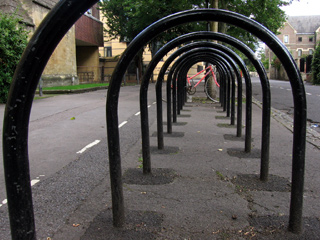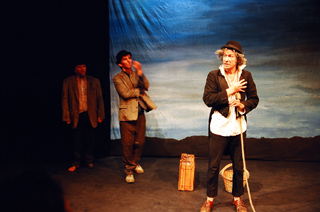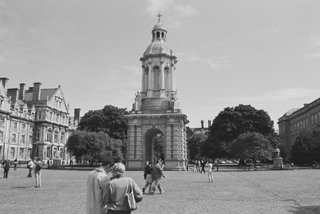A friend of mine challenged me to come up with the collection of items that I would submit to ‘Desert Island Discs’ – a British radio show in which interview subjects are questioned about what they would bring along to soften the experience of being stranded on a desert island:
“Created by Roy Plomley in 1942, the format is simple: each week a guest is invited by Sue Lawley to choose the eight records they would take with them to a desert island.
The discussion of their choice is a device for them to review their life. They also choose a favourite book (excluding the Bible or other religious work and Shakespeare – these already await the “castaway”) and a luxury which must be inanimate and have no practical use.”
First off, I must complement the erudite Gideons who have already stocked the world’s islands not only with Bibles, but also with Shakespeare’s works. Am I allowed to bring Paradise Lost or a book with spiritual importance for me as my “Bible or other religious work?”
Music
Starting with the choice of musical albums, this is no easy matter of selection. I have 667 albums in iTunes alone, and this is a time at which the term ‘album’ is rapidly losing meaning. Thinking about, for instance, how often artists have taken to re-organizing, re-mixing, and re-combining their tracks, the medium of album is becoming more like that of the playlist, of which I have only a few dozen. Of course, each of those is rather too long to fit on a CD (even as data files) and would most definitely not fit on a record, so I am back to the contemplation of albums.
One natural way to proceed would be to choose eight critical artists and then simply select either their best work, or the work that you think would stand up best to very frequent re-listening. In the interests of fairness, I will treat two-disc albums (such at Tori Amos’ To Venus and Back or the Smashing Pumpkins’ Mellon Collie) as two albums, if chosen.
I have long treated music partly as a mechanism for altering moods. Given the dire desert scenario, it seems wise to think that way when planning.
In no particular order, then, my albums would be:
- Jason Mraz – Live at Java Joe
This quirkly live album has an unusual ability to cheer me up, despite the fact that I have heard it so many times I know not only the words, but the timing of all the instruments, by heart. I expect this will be true of all the selections. This is a somewhat difficult thing to choose, because I think five of the thirteen songs are no better than mediocre, but I am going to stick with it for the moment.
- Spirit of the West – Save this House
When going mad in the heat, it seems to me that it would be important to have some record of where you came from. Since Spirit of the West is from Vancouver, they get one such point. Given that they are a band and a style of music introduced to my brothers and I by my father when we were children, they get another. The fact that it’s an excellent album in and of itself cements the choice.
- The Doors – The Doors
Choosing which Doors album to bring is awfully difficult. This is one of those situations where playlists are superior to albums. Likewise, it seems inappropriate to choose one of their many ‘best of’ collections. Despite the absence of some of their best songs, I would have to go with their 1967 debut album.
- Simon and Garfunkel – Bridge over Troubled Water
Choosing a S&G album is even harder than selecting from among those of The Doors. Practically each has a song or two I would put on my own custom desert island disc. Choosing from among their original albums, this would be the one.
- Idan Raichel – Mimamakayim
Bringing at least one album that isn’t in English seems well advised, and this is probably the best one I have heard. While I may not be able to speak a word of Hebrew at the moment, perhaps hundreds of hours of desert island listening would elevate my consciousness – or my imagination – to the point where I think I know what it is about. Even if such a thing doesn’t happen, it can be treated as a piece of classical music with an unusually versatile and emotionally engaging instrument.
- Led Zeppelin – IV
This is an album that I feel myself growing into, to some extent. When I first got it, ‘Stairway to Heaven’ was the only song I could stand, and then only the relatively melodic bits. I would bring it in hopes that my steadily growing appreciation for the album as a whole would mature. I am almost tempted to bring an album that I flat-out do not like, but which friends rave about, but unfortunately haven’t the space for such an experiment.
- Pink Floyd – Wish You Were Here
Not their longest or most celebrated language, I think it is their most sophisticated and intriguing. There is no denying that one would have time to sort out all the complexities given days and weeks.
- Tori Amos – To Venus and Back (Live Disc)
All my friends will have seen this one a mile off. While I maintain that Tori Amos is a musical genius in general, she is especially capable as a live performer. While a recording cannot capture the energy of a concert, this one does an appreciable job.
Naturally, lots of albums were very close to making the cut. It is not necessarily that I think these are my eight best albums – the circumstances of where they are to be enjoyed have been taken into consideration. I have intentionally not considered classical or opera albums, because that would make the selection too daunting.
Book
This is a tough one indeed. The first obvious choice is between taking something you have read and enjoyed or bringing something new. I would opt for the former. Chances are, you will read this book many times. As such, however many times you read it before arriving will soon be trivial. Out the window goes Ulysses, then, which I have tried to read four times but never managed to progress more than fifty pages into.
I am fairly sure attempts to bring something like The Encyclopedia Britannica would defeat the purpose of this exercise, but if I could bring a really massive reference book on scientific, literary, and historical themes, I would definitely do so. I have always wanted an undisturbed chance to brush up on classical and art history, music, botany, and the many other topics about which I know little or nothing.
Given the length of time, the book should be a thick and complicated one. Much as I adore Lolita, it really doesn’t have the kind of physical bulk a person would want for a desert island book. In the end, I think I would go with Anna Karenina. I’ve only read it twice, so there is plenty of depth into which I could yet descend. Also, there might be a good market for an autobiography of someone who slowly went mad reading Anna Karenina, provided he is at some point rescued in a condition sane enough to write subsequently.
Luxury
To me, this is by far the least important. Luxuries are not useless items, but useful ones that are unusually fine. A fancy pen is a comprehensible luxury, as is a fine meal or expensive audio equipment. I assume, if I am being allowed to bring albums, that the audio gear is provided and acceptable.
Ultimately, I think I would choose a musical instrument. I have never learned to play one, and have long wanted to. Naturally, doing so alone on a desert island is not ideal. I would have no scores, no instruction, and no audience. Nonetheless, it would certainly help pass the time – and perhaps express the many longings and madnesses that are certain to arise in such a place. As for which one, the relevant considerations would be resistance to sun and sand, and a low need for maintenance. Anything that needs tuning or new parts is out. Given that I cannot think of any instrument that I would trust to survive the conditions and trust myself to learn, I am abandoning this idea in mid stride. The idea of myself stranded with a clarinet that I have no idea how to play is actually quite heartbreaking.
No musical instruments, then. Writing materials are both useful and not a luxury (at least in this day and age). A fruit tree would be both useful and animate, while the same goes for an olive bush.
Perhaps the thing to bring along is a corrosion resistant razor of a variety that will not dull for many years. In the first instance, it would provide a daily ritual that would help in the recording of the passing of time. In the second, imagine the surprise of your rescuers when they find you clean-shaven and very well versed in Shakespeare!
[Update: 25 February 2007] Since so many people were looking for them, some Idal Raichel lyrics translated into English have been added.





